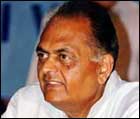'Steps needed to check expenditure'
 K C Pant, Deputy Chairman of the Planning Commission, understands the predicament facing the economy today. In the approach paper to the 10th Plan (2002-07), he has tried to delicately balance the need for increased outlay for states on one hand, and stepping up infrastructure investment on the other.
K C Pant, Deputy Chairman of the Planning Commission, understands the predicament facing the economy today. In the approach paper to the 10th Plan (2002-07), he has tried to delicately balance the need for increased outlay for states on one hand, and stepping up infrastructure investment on the other.
Weaving in the long-term perspective while hoping for an 8 per cent gross domestic product growth, Pant believes the Planning Commission document will propel the country into the high growth orbit. He spoke to
P Vaidyanathan Iyer on the philosophy behind the 10th Plan. Excerpts:
Is there any plan to link additionalities in expenditure to specific and monitorable reform measures by the states?
To some extent, there are linkages to some areas....We do have more areas of this kind, now. We should, while proceeding in these directions, also take into account the reason for these objectives not being achieved.
Why the states are reeling under fiscal pressure, why they are not moving forward. It's more or less transparent now what the problem is. But the question is of finding a way to develop this consensus.
The expenditure of the government grows 10-12 per cent every year and is rigid with subsidies, interest payments and defence outlay accounting for a chunk of the non-Plan expenditure. On the other side, the tax-GDP ratio has remained stagnant, if not declined. How does one get out of this debt-trap because you keep borrowing more every year?
The expenditure growth has to be seen in terms of development expenditure or mass development expenditure. One has to look at different ways to cut expenditure.
For example, in states like Madhya Pradesh, Rajasthan and Uttar Pradesh, they are picking up the boys and girls from the village and appointing them as temporary teachers with much lower salaries. So, expenditure rise partly has to be overcome by innovative approaches.
Then, there are subsidies. The states have to find a better targeting of subsidies. A lot of thinking is going on to reduce food and fertiliser subsidy. Some ways and means will be found. But, while reducing the subsidy, it should be ensured that the poor, who need subsidised food, do not suffer.
The clearance of the Voluntary Retirement Scheme package by the Cabinet recently indicates the government's unwillingness to retrench its staff. The Cabinet rejected the retrenchment clause which was part of the original proposal?
Let us see what's the response to the VRS package. We can then reconsider this. I think, there was proper discussion and the Cabinet decided to proceed as it has.
How have you addressed the infrastructure issues while drafting the approach paper?
Private sector investment in the infrastructure has not come the way one would have desired. And there is little choice here. The economy requires investment in roads, power, etc.
Roads have been a success story. But in power, the track record has not been so good -- both in terms of generation and improvement in distribution -- to keep up the momentum.
The use of diesel is taking a lot of load. Using diesel substantially for power generation is wrong. The state electricity boards require an overhaul.
The Centre is doing its bit by collecting user-charges according to tariffs fixed by regulators. The states too will have to realise this.
What were the obstacles in drafting the approach paper?
The Fifth Pay Commission has created a fiscal problem for the Centre and the states. In the last few years, reliance on borrowings to sustain the Plan expenditure has increased.
Part of the borrowings are being used to fund revenue expenditure. Whereas all of this has to be used for capital expenditure or for investment which would earn returns.
The states have to take hard decisions. For example, I know of one state which has delinked its pay scales from the central pay scales. The government of today there has to pay as much as 40 per cent higher wages and salaries.
Powered by 
YOU MAY ALSO WANT TO READ:
The Rediff Budget Special
Run-Up To The Budget
Interviews
Money

